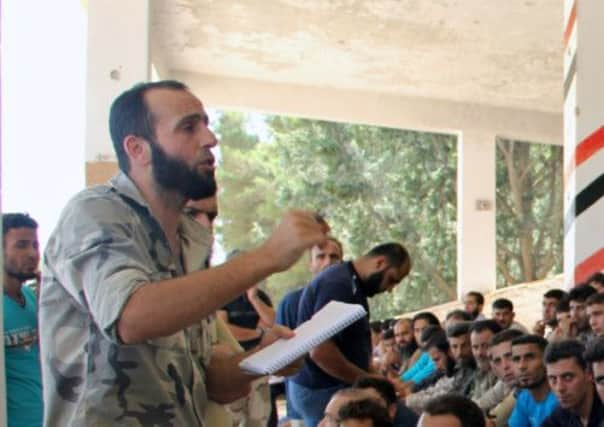Syria: Rebel leader Abdul-Qadir Saleh dies


The death of Abdul-Qadir Saleh, founder of the Tawhid Brigade, followed advances by president Bashar al-Assad’s troops against rebels on two key fronts – the capture of a string of opposition-held suburbs south of Damascus and the taking of two towns and a military base outside the northern city of Aleppo.
An ongoing offensive meanwhile is driving hundreds of refugees into neighbouring Lebanon, as government forces seek to dislodge rebels from a mountainous area that stretches north of the Syrian capital. A total of around 6,000 have crossed to a Lebanese border town over the past three days, the UN says.
Advertisement
Hide AdAdvertisement
Hide AdThe Tawhid Brigade is one of Syria’s best known and powerful rebel groups, with an estimated 10,000 fighters, and is particularly strong in Aleppo province. Under Mr Saleh’s command, the group last year spearheaded a rebel push that seized large sections of the provincial capital Aleppo.
Last Thursday night, a government air strike hit its command post in Aleppo province, according to local activists and the UK-based Syrian Observatory for Human Rights. The 34-year-old Mr Saleh was severely wounded and later died in a hospital in Turkey, according to a brigade spokesmen who goes by the name of Akram al-Halaby.
Mr Saleh was buried in his hometown of Marea in Aleppo province. The brigade’s political chief, Abdul-Aziz Salameh, who was lightly wounded in Thursday’s attack, was appointed to succeed Mr Saleh, he said.
Mr Salameh himself announced Mr Saleh’s death in a video uploaded to YouTube.
“Our martyrs are in heaven and yours are in hell,” he said, addressing Mr Assad’s forces.
The Tawhid Brigade was once part of the mainstream Free Syrian Army, considered to be the military wing of Syria’s exiled Western-backed opposition. But in September, the brigade broke away and later formed the Islamic Authority, a coalition of Islamic rebel groups, including one linked to al-Qaeda.
Mr Saleh’s trajectory reflected that of many ordinary Syrians who joined the armed uprising against Mr Assad’s rule. He was a married merchant who took part in peaceful demonstrations that began in March 2011. After a violent crackdown by security forces, Syria’s conflict became an armed uprising and Mr Saleh turned to guns. He founded the Tawhid – or Monotheism – Brigade some ten days before rebels overran and seized parts of Aleppo, Mr al-Halaby said.
A video uploaded to social media networks in 2012 shows Mr Saleh speaking as a bomb or shell hits near a building in Aleppo, causing him to briefly flinch. His comrades call on him to rush inside for protection, but he stands outside, saying: “Nobody dies until God gives him his life, and his date of death.”
Advertisement
Hide AdAdvertisement
Hide AdIn an interview with the Opposition Orient Television from a battlefield in eastern Aleppo last week, Mr Saleh said: “We will not let Iran and Hezbollah advance except on our dead bodies.”
His death was the latest setback for the rebels.
Elsewhere in Syria, they are on the defensive in a high-stakes battle for Qalamoun, a mountainous area that stretches north of the Syrian capital along the Lebanese border.
It appears to be part of a long-anticipated government offensive aimed at cutting supply routes to rebel-held areas around Damascus, and cementing Assad’s hold on a key corridor from the capital to the coast.
The fighting has centred around the town of Qara lying on the main road leading from Damascus to the central city of Homs.
Anti-government activists said clashes were still ongoing yesterday, with Syrian forces firing rockets toward the town.